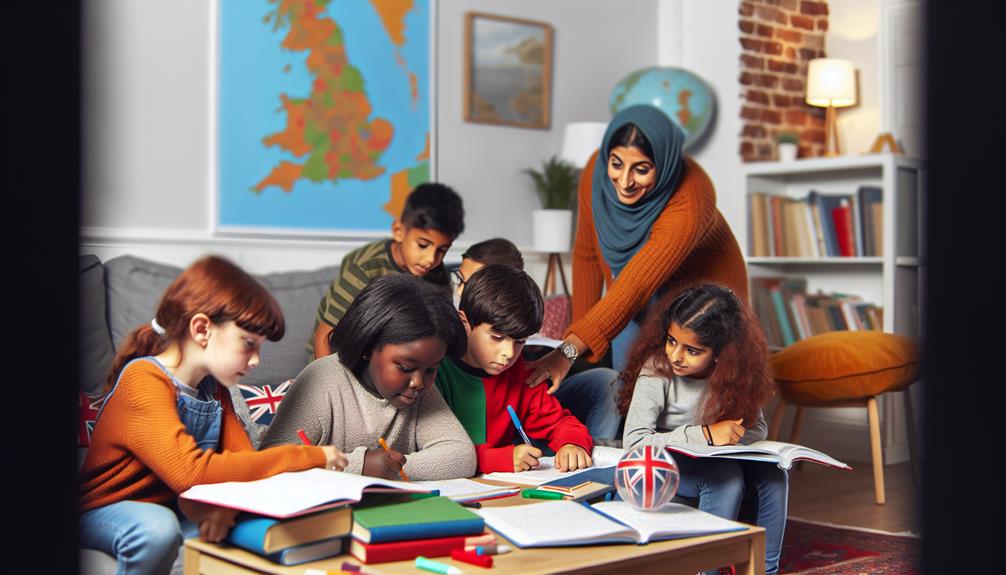Foster care impacts the education of the nearly 60,000 children involved within the UK system. Often, stigma and misconceived beliefs lead to educational set-backs. Frequent changes in placements disrupt academic consistency, while traumas pose enduring emotional challenges. However, with a stable home environment, targeted interventions, and ongoing support, foster children can indeed thrive. The role of foster parents is pivotal; they actively participate in their child's education, advocating for their rights. Delving further into the complexities surrounding the care system, it's clear that understanding these key dynamics could transform their educational journeys. Stick around for more insights on fostering academic success.
Key Takeaways
- Approximately 80,000 children in UK care, with 60,000 in foster care, face educational challenges due to stigma and frequent placements.
- Foster parents play a crucial role in the child's academic success, advocating for their educational rights and providing a stable environment.
- Emotional trauma and continuous environment changes in foster care negatively affect children's educational outcomes and concentration.
- Targeted interventions, such as tutoring programs and trauma-informed teaching, can help foster children overcome educational barriers and thrive acadically.
- Policies and reforms, including funding solutions and caregiver training, are being implemented to improve the foster care education system in the UK.
Understanding UK Foster Care System

Delving into the heart of the UK foster care system, you'll find a complex yet essential structure geared toward providing a safe and nurturing environment for children who can't live with their own families. However, despite its pivotal role, there's an enduring 'Foster Care Stigma' that often forms a significant barrier to its success. Misconceptions and stereotypes lead to negative perceptions, impacting both the children and the foster parents involved.
Foster children face an uphill battle in schools, sometimes seen as troublemakers, or less capable. This stigma can hinder their educational progress, instilling a sense of insecurity and low self-esteem. Simultaneously, foster parents may feel judged or ostracised, which can affect their motivation and involvement.
Speaking of involvement, 'Parental Involvement' plays a vital role in a child's education, particularly for foster children. Active engagement in their learning journey can provide the stability and support they often lack. Foster parents need to be actively involved in school activities and parent-teacher meetings, playing a proactive role in their foster child's education.
Understanding these aspects of the UK foster care system is essential. By addressing the stigma and encouraging parental involvement, we can improve the educational outcomes for these children.
Statistics: Children in UK Foster Care
Shifting our focus to the numbers, it's important to grasp the scale of children in the UK foster care system and how this might affect their education. In the UK, there are approximately 80,000 children in care at any one time, with nearly 60,000 in foster care. That's a significant number, and it's growing year on year.
The foster care stigma, unfortunately, remains a substantial hurdle that these children face, affecting not just their social interactions but their educational outcomes as well. Studies show that children in foster care tend to perform less well academically than their peers. This isn't surprising, given the additional emotional and psychological stress they're dealing with.
The adoption change, too, can be a tumultuous time, adding further disruption to their educational journey. Research indicates that children who experience frequent placements or long stays in care are more likely to have poorer educational outcomes.
The Role of Foster Homes in Education

In understanding the educational challenges for children in foster care, it's crucial to examine the pivotal role that foster homes play in shaping these educational experiences. Foster homes are more than just a safe haven; they form the backbone of the child's learning environment.
The first step in this process is Foster Parent Training. This isn't merely about dealing with behavioural issues or providing a stable environment. It's about understanding the unique educational needs of these children and finding ways to meet them. You, as a foster parent, play a critical role in this. Your training equips you with the tools necessary to advocate for a child's educational rights, to engage with their learning, and to provide academic support.
Additionally, School Integration Techniques are crucial in ensuring that foster children adapt to new academic settings. These techniques help build confidence, cultivate social skills, and promote academic engagement. They create a smooth change that aids in reducing the disruption that frequent school changes can cause in a foster child's education.
In essence, the right foster home can significantly impact a child's educational journey, shaping their academic future positively.
Foster Care Impact on Academic Performance
While the role of foster homes in education is essential, it's equally important to understand how foster care directly impacts a child's academic performance. You'll find that children in foster care often face unique academic challenges due to instability and trauma. They may struggle with concentration, have gaps in their learning, or display behavioural issues that can be a barrier to their educational progress.
However, with the right support systems in place, such as tutoring programs, these children can exhibit academic resilience. These programs provide personalised attention, helping to fill learning gaps and boost confidence. This one-on-one interaction can be instrumental in improving their academic performance.
Furthermore, foster parents can positively influence a child's education by fostering a supportive and stable home environment. This includes regular communication with teachers, encouragement, and setting realistic expectations.
It's important to remember that while the academic performance of children in foster care may initially be affected, they possess the potential to thrive academically with the right support and resources. This resilience, coupled with targeted interventions, can significantly enhance their educational outcomes.
Emotional Impact and Education Outcomes

Not only does foster care affect a child's academic performance, but it also has a profound impact on their emotional well-being and subsequent education outcomes. Imagine a child's education disrupted by frequent shifts between foster homes. These changes can lead to an emotional turmoil that often impedes a child's ability to focus on learning.
Emotional resilience, hence, becomes not just a concept, but a survival tool. However, the ability to bounce back from adversity is often compromised in these children due to their unstable living conditions. This lack of resilience can have detrimental consequences on their academic progression.
Consider the following:
- The continuous change in the environment can lead to feelings of insecurity and heightened anxiety, which can directly affect their concentration and academic performance.
- A lack of emotional resilience may make it more challenging for foster children to form positive relations with peers and teachers, which are essential for a conducive learning environment.
- Children in foster care often have to grapple with feelings of rejection and abandonment, which can potentially lead to behavioural problems, further impacting their engagement in school.
Understanding these emotional impacts is pivotal to improving the education outcomes for children in foster care.
Support Systems for Foster Childrens Education
Countless support systems are essential to enhancing the educational experience for foster children and helping them overcome the unique challenges they face. Two key elements of these systems are Education Funding and Tutoring Programs.
Education Funding provides the means for educational resources and opportunities. Tutoring Programs offer essential learning support, often crucial for foster children who may have suffered disruptions in their education.
Consider the table below:
| Support System | Purpose | Impact |
|---|---|---|
| Education Funding | Provides financial support for educational resources | Helps to level the playing field |
| Tutoring Programs | Offers personalized educational assistance | Bridges learning gaps and improves academic performance |
| Mentoring Programs | Provides emotional and social support | Enhances self-esteem and social skills |
| Therapeutic Services | Addresses mental health needs | Supports emotional wellbeing and academic success |
You'll see the interconnected nature of these support systems. Each plays a role in the holistic development of the foster child, addressing distinct yet interrelated needs. Let's remember, every child deserves a fair shot at education. With these support systems in place, foster children have a better chance of reaching their full academic potential.
Case Studies: Success Stories in Foster Education

Let's now turn our attention to some heartening success stories in foster education.
These cases, where children have overcome educational barriers and found academic success, serve as potent examples of resilience and determination.
They not only highlight the potential within each child in foster care but also underscore the difference supportive foster systems can make.
Overcoming Educational Barriers
Despite the significant hurdles that foster children often face in their educational journey, many have managed to overcome these challenges and thrive academically. This success is due largely to personal development and trauma-informed teaching, two key factors that contribute to overcoming educational barriers.
- Personal Development: Fostering self-esteem, resilience, and a growth mindset play pivotal roles in achieving academic success.
- Trauma-Informed Teaching: Understanding and addressing the impact of trauma on learning can greatly improve educational outcomes.
- Supportive Environment: Providing a nurturing and stable environment can help foster children focus on their studies and reach their full potential.
These elements, when integrated, form a robust framework to help foster children surmount their educational challenges and succeed in their academic pursuits.
Fostering Academic Success
While it's true that many foster children face significant educational challenges, there are also numerous inspiring success stories where individuals haven't only overcome these obstacles, but have gone on to achieve remarkable academic accomplishments. This is often a result of teaching resilience, a vital factor in fostering academic success.
Consider the case of one young lady who, after several school changes, found stability in a foster home that prioritized her education. With the support and encouragement of her foster parents, she went on to earn a full scholarship to a top-tier university. Her story is a proof of the potential foster children have when given the right opportunities and support. Remember, each child in foster care has the potential to become another such success story.
Challenges in Foster Care Education
Traversing the educational landscape can prove particularly challenging for children in foster care, with issues ranging from frequent school changes to lack of academic support. This is where the importance of thorough teacher training and individual learning plans come into play.
Foster children often face a unique set of challenges that can hinder their academic progress. They are:
- Frequent school changes leading to inconsistency in learning
- Lack of personalized academic support and understanding
- Trauma-related emotional and behavioral issues affecting learning
In many cases, teachers may lack the necessary training to understand and address these issues, making it harder to provide the individualized educational plans these students need. Additionally, the emotional trauma foster children often carry can manifest as behavioral issues in the classroom, further complicating their academic journey.
You see, the educational challenges that foster children face aren't insurmountable obstacles. However, they do require a tailored approach that considers the unique circumstances these children navigate. Recognizing the significance of these challenges is the first step in working towards effective solutions and better educational outcomes for these children.
But, discussing the desired policies and reforms for foster education improvement, which is the next subtopic, will help further clarify this.
Policies and Reforms for Foster Education Improvement

You've seen the challenges within the foster care education system; now it's time to explore potential solutions.
Let's look at policies presently in place and discuss how they could be reformed for the better.
You'll see that with the right changes, we can indeed improve educational outcomes for foster children.
Foster Care Education Policies
In the quest to improve educational outcomes for children in foster care, numerous policies and reforms have been implemented, aiming to address the unique challenges these youngsters face. You'll find that these strategies often encompass two key areas: funding solutions and tutoring initiatives.
- Funding Solutions: This involves providing financial support to guarantee continuity and stability in foster children's education. It's about enabling access to resources, from textbooks to technology, that enhance learning.
- Tutoring Initiatives: Here, efforts are made to provide foster children with personalized academic support. This can range from one-on-one tutoring sessions to dedicated study groups.
- Policy Adjustments: These target the systemic barriers that hinder foster children's educational progress, aiming to create an inclusive, supportive educational environment.
Reforming Foster Education System
While these policies and initiatives have made strides in addressing the educational needs of foster children, there's a growing call for more encompassing reforms to the foster education system. One such reform is centered on 'Educational Advocacy'. It's about empowering you, the caregiver, with the knowledge and skills to navigate the complexities of the educational landscape on behalf of your foster child.
Caregiver Training is another critical area of reform. A well-trained caregiver can provide the emotional and academic support foster children need to thrive. By equipping caregivers with effective teaching strategies and an understanding of the unique challenges foster children face, we can begin to bridge the educational gap.
These reforms don't just benefit foster children; they strengthen the entire foster care system.
Frequently Asked Questions
How Can Biological Parents Contribute to the Education of Their Children in Foster Care in the Uk?
You can enhance your child's education through parental engagement, even in foster care. Advocate for their educational rights, stay involved with school activities, and communicate regularly with teachers to support their learning journey.
What Specific Training Do Foster Parents Receive to Help Them Support a Foster Child's Education in the Uk?
In the UK, foster parents receive training in tutoring resources and educational advocacy, equipping them to support a foster child's learning journey. They're taught to navigate the education system and facilitate productive learning environments.
Are There Any Financial Aid Programs Available for Foster Children's Higher Education in the Uk?
Yes, there are financial aid programs in the UK for foster children's higher education. You'll find scholarship opportunities and educational legislation designed to support these students financially and academically.
How Does the UK Government Ensure the Mental Health Support for Foster Children to Enhance Their Educational Outcomes?
The UK government emphasizes therapeutic intervention importance and school integration strategies to support foster children's mental health, enhancing their educational outcomes. They're providing necessary resources, ensuring their emotional stability to thrive academically.
How Do the Educational Outcomes of Foster Children in the UK Compare to Those in Other Countries?
When you examine international comparisons, you'll find that UK foster care policies greatly affect children's education outcomes, often leading to better results than in other countries due to robust mental health support systems.
Conclusion
So, you've journeyed with us through the thorny thicket of the UK foster care system and its impact on children's education. You've seen the highs and lows, the triumphs and trials.
But remember, these children aren't just statistics, they're our future. With the proper support, they can flourish where they're planted.
Let's collaborate to guarantee every child in foster care gets a fair shot at education. After all, they're not just surviving, they're thriving.




